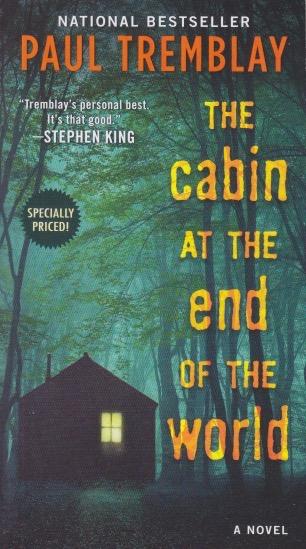
I’ve been writing on religion and horror for quite a few years now. Sometimes you come across a horror movie, or novel, which addresses this directly. Paul Tremblay’s The Cabin at the End of the World is one such novel. A friend strongly recommended this, and indeed, the first half went impossibly fast. This despite my dislike of home invasion stories. It nevertheless kept me on the edge of my seat. I should probably say there will be spoilers here (there will), in case you haven’t read this but intend to. I’ll hold off on them until the next paragraph, though, so if you’re a faster reader than I am a writer you won’t accidentally run upon them. So, a family consisting of two fathers and an adopted daughter find the cabin, where they’re vacationing, invaded by four people who believe the world is going to end. Spoilers follow!
The world is going to end unless the family agree to sacrifice one of themselves to stop the apocalypse. The strangers are armed while the vacationers are not. And, as usually happens when those with weapons confront the innocent, the armed prevail. But. But the family refuses to sacrifice anyone. Then the brainwashed four do something unexpected—they kill one of their own. They continue to do this, attempting to convince the men that if the invaders all die, and neither of the men is sacrificed, the world will end. Quite a bit of the novel then becomes a theological discussion regarding what kind of god would make such a demand. Of course, if you read Genesis you’ll already know the answer, right Isaac?
Tremblay knows not to tip his authorial hand as to what’s really happening. As the cabin becomes a mess of blood and gore, the television seems to be showing predicted apocalyptic events. The invaders can’t reveal their source of secret knowledge because they receive visions telling them what to do. The whole thing raises that most troubling of questions: who is really in charge? Is there a bloodthirsty deity who requires a willing death or are the invaders simply good at acting out their paranoia and interpreting events to meet their expectations? So it is that Cabin becomes a disturbing story—nearly a theodicy—asking age-old questions of what happens when religious belief conflicts with rational materialism. There are enough hints of supernatural happenings to make the reader wonder. And when it ends it affirms something many of us are exploring these days—religion and horror have much in common but neither is clearly understood.
